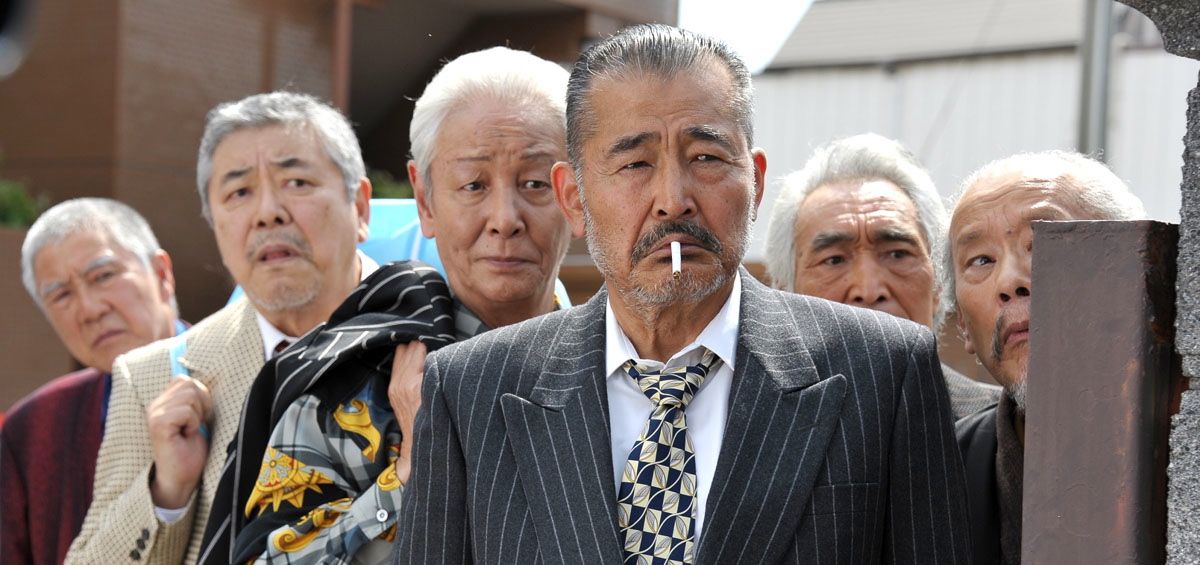
In light of the tepid response so far to Takeshi Kitano’s latest film, Ryuzo and His Seven Henchmen, it’s worth briefly noting the different cultural legacies Japan’s renaissance man has at home and abroad. Cinephiles embraced his early films as director, starting with 1989’s Violent Cop, as a the voice of one of the most exciting filmmakers in the world. Beautiful, elegiacal visions of a lonely existence in the yakuza lifestyle, always near a beach, always with at least one sequence you probably hadn’t seen before (the bizarre foot chase in Violent Cop, or the entire middle section of Sonatine (1993)) and full of the sort of narratively-relevant but high-impact violence we sophisticates aren’t supposed to admit we crave. And yet in Japan, “Beat” Takeshi is a well known figure before these films, a comedian who fronts tacky game shows and cut his teeth as part of stage comedy duo, who went on a curious tangent in making small, dark films in amongst his more lucrative media appearances. So a film of only moderate ambition like Ryuzo may disappoint the former camp, but marks a return to the kind of broad, unpretentious humour that Kitano has always had an affinity towards, and is ultimately funny enough to succeed on those terms.
Retired yakuza Ryuzo (Tatsuya Fuji, of In the Realm of the Senses fame) lives with his law-abiding son and family, an existence only punctured by occasionally meeting with old friends to eat, drink and harass strangers. After inadvertently disrupting the scams of a small-time fraud ring, Ryuzo joins forces with seven former accomplices (played by veteran characters actors from the 1960s) to make a new yakuza to stamp out this new breed of criminal – though not before unsuccessfully trying fraud themselves. Meanwhile, an old police officer they knew from decades past (Kitano himself) has both groups under his watch.
On paper this project seems close to Kitano’s career-long obsessions; of changing values and codes within those crime hierarchies, and a clash between old notions of honour and new, millennial criminals preying on the vulnerable. Even one of Kitano’s least successful films, his English-language Brother, draws some strength from tensions like these. But in this case he isn’t the least bit interested in those sort of thematic undercurrents. Ryuzo is a very simple exercise in broad comedy, and it’s strange to see Kitano pass up obvious fodder for any sort of exploration into the gangster psyche instead to milk jokes. Sometimes this is confusing –some scenes (including an hilarious exchange where Ryuzo unwittingly scares off a potential scammer) are predicated on a cultural fear of “old school” yakuza mythology, and in other scenes the joke will come from the fact that they’re not taken seriously at all nowadays. Both are interesting ideas but Kitano hedges his bets, following the gags rather than any consistent thematic through-point.
Likewise the film sacrifices character to the comedy gods, as outside some outward eccentricities (one is inspired by Steve McQueen, and fires his gun randomly) we don’t really learn anything about the henchmen, which is perhaps testament to the fact that seven characters is far too many for a film of normal runtime, and once more exist only for the jokes (generally at their expense). Ryuzo does use them as part of its homage to the yakuza movies of old, and there are a handful of clever black-and-white flashback sequences in the style of old films. Likewise, freeze-frames, a wide 2.35 scope and other references (finger-cutting) resonated particularly in the context of Melbourne International Film Festival as many of the audience had clearly attended the retrospective of Kinji Fukusaku’s Battles Without Honor and Humanity just a week before. But these are only small elements in an undistinguished visual style, a long way departed from Hana-bi.
And yet astute readers will notice my sign of approval at the top of the review. It’s a glaringly flawed film, and the least interesting film from Kitano by a considerable margin, but it’s very funny and won over its festival audience in its ideal later spot in the program schedule. The performers are all completely committed to the insanity, and set-pieces such as the henchmen deciding their leader by trying to upsell their own criminal histories to a point system are examples of ensemble comedy done right. By the end, dumb jokes like the henchman who has flashbacks to war under Imperial Japan against the US make sense in the film’s gag-a-minute style, and some enjoyable dynamics (like proud yakuza Ryuzo and his embarrassed meek son) make this a much more enjoyable watch than its early critics will admit. Is Kitano above this sort of thing? Probably, but there’s a sense of fun that he and the actors have had making it that ends up being very contagious.
Around the Staff:
| Jeremy Elphick | |
| Felix Hubble | |
| Jess Ellicott | |
